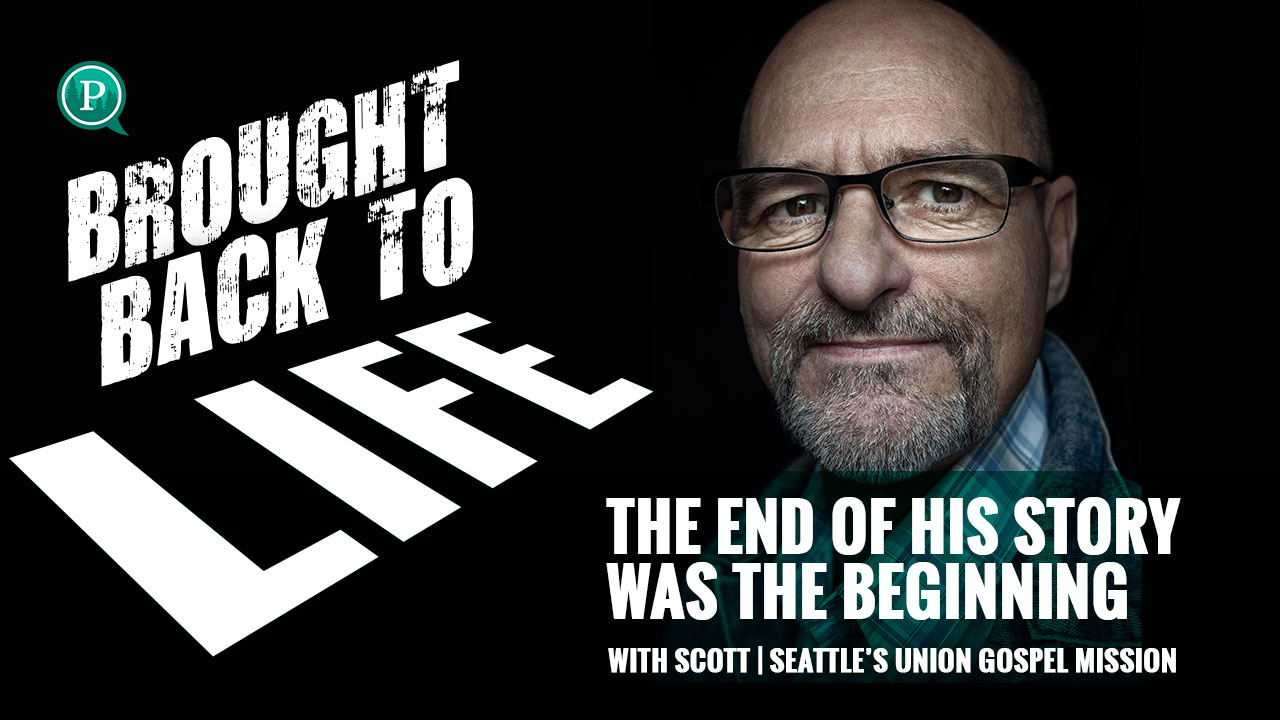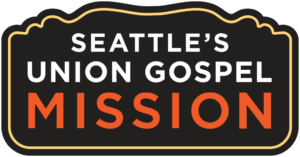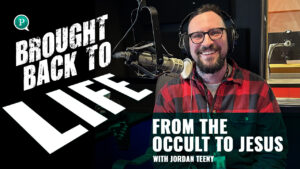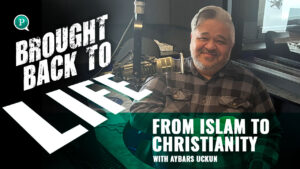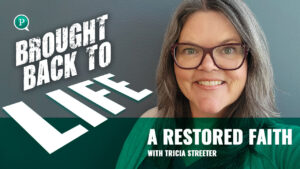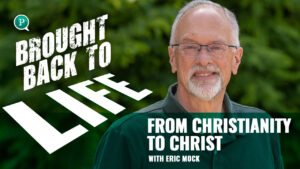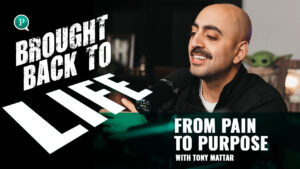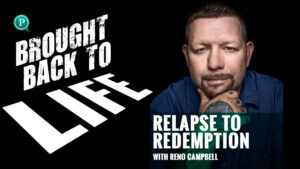Scott tells his story of going from a life of drugs and alcohol, living in the Mohave desert homeless, to becoming the VP of the Men’s programs at Seattle’s Union Gospel Mission.
Special thanks to our sponsor Seattle’s Union Gospel Mission, who have been serving the homeless population and helping the lost become found for over 90 years. Their vision is to see every homeless neighbor — beloved, redeemed, restored. Find out more about them at ugm.org.
Transcription:
Purposely, your life, God’s purpose. Listen at onpurposely.com.
Scott Cleveland:
Well, I used to be homeless living on a mattress out in the Mojave Desert of Southern California, and now I’m leading the three men’s programs for the Seattle’s Union Gospel Mission.
Speaker 1:
Welcome to Brought Back to Life, a podcast where we explore how Jesus changes everything.
Scott Cleveland:
My name is Scott Cleveland. I grew up the seventh of 10 kids, so a really large family, born and raised in Palmdale, California. And yeah, somewhere along the line, my brother and I were out in the Mojave Desert riding a motorcycle and something really cool happened that day. My brother taught me how to ride a motorcycle, and it became a real love for motorcycles in general, but more importantly, a real bond between my brother and myself. My brother is a Vietnam veteran and he went off to fight in the Vietnam conflict, and I stayed home because I had my own battles to fight right here in my hometown. My brother and I were using drugs and alcohol in the Mojave Desert and became really strung out on drugs and alcohol, and that led to homelessness. And eventually my brother ended up in the High Desert hospital and his body had gotten septic from the drugs that he was using.
And my brother, I remember the doctors were telling us later that Bobby had actually gone into the hospital and turned septic. And so during that time, both Bob and I ended up in the hospital, small hospital in the Mojave Desert and started getting some help through the hospital out there. Yeah, I think our lowest point was when I woke up in the hospital, my brother was in a, what they call a drug-induced coma. And I had some surgery that was done on my right leg because of such a big abscess and I remember looking over at my brother Bob, and he actually had a hole in his throat and he had a tube coming out of his throat so he could breathe. And I remember thinking to myself, this is the end of our story, but really in hindsight, it was the beginning of our story.
It’s where we started the process of escaping homelessness and addiction, and we entered the Seattle’s Union Gospel Mission. Graduated from the New Vision recovery program on Capitol Hill. It’s a one-year inpatient residential recovery program for guys with substance abuse issues. I was pretty apprehensive when I first came into the mission. I’d never been in a mission before and change seemed pretty difficult at the point in time, and of course I was separated from my family and that type of thing. So yeah, I was pretty apprehensive. It’s the relational aspect of the program that really had the most impact on me. People that could see something in me that I couldn’t see in myself, people that were loving on me in a way that I couldn’t love myself, a community that understood the triumphs and the tribulations of getting clean and sober, the community that ultimately led me to the saving knowledge of Christ.
Well, clearly I don’t use drugs and alcohol anymore. It’s been 24 years. I actually celebrate my 24th year sobriety date this month, so that’s pretty exciting. I’m married. I have four children. We own our own home, and I’m the vice president of the men’s program for the Seattle’s Union Gospel Mission. So what a lovely way to give back to the program that gave so generously to me. Well, that I even have a future is pretty amazing, and so I’m always grateful that there were people that came before me that had the skills and the heart to serve me for sure. But I think what I’m really hopeful for is the mission is just always getting better, and I get to be a part of that process and some of the strategic planning. And so our hope is that we can serve more people and that more people will come to the saving knowledge of Jesus Christ.
I’m the vice president of program for the Seattle’s Union Gospel Mission, so I actually oversee all three of our men’s programs. Well, if you need help, all you have to do is call (206) 501-HELP, which is great, but if you want to be a volunteer, you can just go to our website ugm.org and sign up for a volunteer opportunity. I think it’s just the deep gratitude that I have for the mission and not the buildings or the places that people see or associate with the mission, but it’s really the staff. And so the staff, they operate in such a way that you know that they’re called to the mission. It’s not a job for them the way that they love and care for the general population. It’s just a unique population to be involved with. Well, I used to be homeless living on a mattress out in the Mojave Desert of Southern California, and now I’m leading the three men’s programs for the Seattle’s Union Gospel Mission.
I’m currently supporting three directors who oversee three divisions of the Seattle’s Union Gospel Mission. In addition to that, we are making some strategic plans to better ourselves all the time. One of the things that I’ve been instrumental in is moving away from the old enhanced shelter model and moving into a new way of serving people at the Seattle’s Union Gospel Mission. Super excited to be able to present the new enhanced shelter model where individuals get case management, they have a safe place to store their belongings, and they can stay there as long as they’re working on barriers that keep them stuck in a cycle of homelessness. It’s a new way of serving people on the streets, and it was really great to be a part of the process that made this thing materialize.
Speaker 1:
In a city at times best known for its cold shoulder, Seattle’s Union Gospel Mission has been transforming lives for over 90 years. Back during the Great Depression, they started by serving soup to those in need. Today they offer round the clock care 24/7 to thousands in the greater Seattle area. Motivated by faith and hope, they want everyone to know that they are loved, cared for by us and by God. They’re more than just a shelter. They’re a place of healing. They address root causes and break the cycle of homelessness through relationships and long-term recovery programs. Join the mission in making a difference. Volunteer, donate and be inspired at ugm.org. Seattle’s Union Gospel Mission, where hope transforms lives.
Scott Cleveland:
I believe that Jesus Christ is alive and well and is transforming lives. And I believe that because he’s transformed my life and I watched him transform people’s lives on a daily basis here at the Seattle’s Union Gospel Mission. Well, my mom actually would bring me to church on a pretty consistent basis when I was a kid. I’m the seventh of 10 kids, but I was the one my mom took to church with her, and I think she did that for her own comfort to tell you the truth. She could just drag me along with her. I was 5, 7, 10, 11, 13 years old, but I came to know Jesus when I was 13 years old at a Corrie Ten Boom movie. Actually, when I watched the movie, there was an altar call after that, and I knew in my heart that I wanted Jesus to be in my heart and I turned my life over to Jesus at about 11 years old.
And I wish I could tell you that was the end of the story and things were just wonderful, but it’s not the truth. The truth is I really backslid when I was about 17 years old, started experimenting with drugs and alcohol. And at some point in time, I met up with my brother who’s a Vietnam veteran, who I loved dearly. And I think I’d mentioned before, we just made a real connection when I was five or six years old. He taught me how to ride a motorcycle in the Mojave Desert and just a passion for motorcycle riding and a passion for him just took place that day. But Bob went off to a fight in the Vietnam conflict and then somewhere in the early ’90s we reconnected and I had my own stuff that I had to work with. I had some abandonment issues because of my biological dad.
And so we got together, it was a bit of a perfect storm to tell you the truth, and we started using drugs and alcohol. The interesting thing about marijuana, alcohol, heroin, cocaine has a beginning and a middle and an end. And the beginning is experimentation, and the middle is loss of control, and the end is death. And we were slowly marching our way toward death until we finally ended up in a hospital in the Mojave Desert. And I know that the doctors had called, or social service people had called my mom and said, “Hey, your son, we don’t know if he’s going to make it or not.” And they were talking about Bobby. They’d put him in a self-induced coma because his body had gone septic. So my folks, they were ready to see Bob, they were prepared, but they were not prepared to see me.
And I had a very large abscess on my hip, and so my mom made arrangements where I could get into the hospital pretty quick there, and they lanced that. And I do remember just waking up in the hospital, the smell of the hospital room. I remember the sound of the heart monitor. I remember looking over at Bob and he had this tube coming out of his neck in order for him to breathe. And I thought to myself at the time, hey, it’s the end of our story, his last chapter. We had run this thing off the rails. But the truth of the matter is, it was the beginning of our story. And through a bunch of phone calls, my mom was able to get me into the Seattle’s Union Gospel Mission, flew me up here, and Bob was still in a coma, stayed in the hospital. I came out a few weeks later.
And so yeah, there was a time where I found the Lord during that period of time. And yeah, things started changing for me. I fell in love with Jesus and my life started changing. Well, I feel like I bottomed out at some point in time. I mean, I really gave up hope, just felt like there might not be any hope left for me. And I think that part of that bottoming out, it’s kind of like the story of the prodigal son. There just came a time where there was nowhere else to go but back to my Heavenly Father. There wasn’t any other option. And so really coming back to the Lord for me was about humble obedience. And it’s a hard way back to the Lord, but that was the way for me. Yeah, well, I actually remember early on in program, the director had come by the office and said, “Hey, Scott, you better pay attention. God’s got a calling on your life.”
And so I really started digging into the word of God, and I believe that he was sharing with me to stay back and till the fields. This was really going to be a journey for me here at the mission. And so I’ve had some really super neat encounters because of that process. I remember a young man coming into my office one day, and he was young, 18, 19 years old, and he said, “Scott, I heard you talking about Jesus. I’d like to know more about him.” And so I shared a little bit about Christ’s story and I said, “I think God’s got an offer to you today.” And I was actually able to lead him through the sinner’s prayer. A kid that never knew Jesus before coming to know Christ, and that was really special to be part of that process with him.
Well, life’s a journey. I mean, it’s not all fun and games, that’s for sure. I think I’m still learning. One thing about working at the mission, at some point in time I thought, hey, I have a lot to offer the mission. I went back to school. I’m a substance use disorder professional. Started working my way up through the ranks, so to speak. I became the program director for the men’s programs here. But the reality is I believe that it’s the guys, the program guys and the staff here that make me a better individual. It’s not just what I’m bringing to the plate, it’s actually the guests are making me a better person as well. I feel like we’re on a transformational process with one another. Well, my family, my wife works for a nonprofit organization as well.
She works for Vision House and my kids are up and well, doing good. Raina’s in Running Start this year, and my three girls have graduated college, and my eldest has a couple of kids, so I’m a granddad, which is pretty great. Yeah, our family’s doing well, in good health, and we live in Auburn and are enjoying the Auburn community. I think my hope for the future is actually sticking with the Seattle’s Union Gospel Mission, helping other people who have lost track of life, and just helping people re-unite themselves with family, with community, and the love of Christ.
Speaker 1:
Do you want to share your Jesus story or know someone who should? Let us know at [email protected]. If you loved Brought Back to Life, support us with a five-star rating and review.
Follow this podcast:

